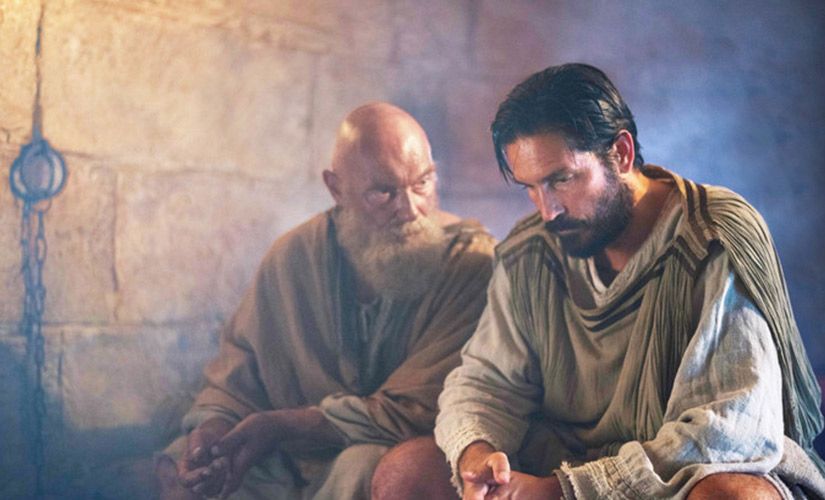While Paul: Apostle of Christ covers events just after the New Testament’s coverage ends, it is richly informed by Scripture. It draws us into the ancient world, where those who follow Jesus are exploring how to live out their faith in critical situations. Viewers will come away with a greater sense of the world of the Bible, especially the fearsome power of Rome.
Driving to Rome
The book of Acts is a vehicle that drives us from Jerusalem to Rome. At the beginning, the resurrected Jesus is still with his disciples, giving them final instructions before he ascends to heaven. He says they will be “witnesses,” and then he draws them a verbal map: Jerusalem, Judea, Samaria, the ends of the earth (Acts 1:8). This geographical progression is essentially the outline of Acts.
The prediction from Acts 1:8 begins to come true in Acts 8:1, as persecution pushes the Christians out of Jerusalem, into Judea and Samaria. That verse also ends the story of Stephen’s martyrdom with a glimpse of Saul attending that execution. In later chapters we see Saul, aka Paul, carrying the Christian message through the Roman world. The book of Acts ends with Paul under house arrest in Rome, the capital of the empire that nearly spanned the “ends of the earth.”
Looking Beyond Acts
What happened to Paul after the book of Acts stopped tracking him? History doesn’t give us all the details, but there are some strong clues. It’s likely that Paul was released from his detainment in 62 AD and traveled west to Spain, as he had previously planned (Romans 15:24). Church leader Clement, writing around 95 AD, reported that Paul had traveled to “the farthest limits of the West.” (This could refer to Britain, but since the apostle already had his eyes on Spain, that’s a better guess.) Then Paul may have established Titus in Crete (Titus 1:5), helped Timothy in Ephesus (1 Timothy 1:3), or kept a promise to see Philemon in Colossae (Philemon 22). Assembling hints from his letters, we surmise that he might have spent time in Macedonia as well. And then there’s the cloak he left in Troas (2 Timothy 4:13), a seaport on the Aegean.
The Fire that Changed Everything
In 64 AD, a massive fire raged through Rome. You may have heard that Emperor Nero “fiddled while Rome burned,” reflecting the rumor racing through the city: that Nero had the blaze set in order to clear room for his own building projects. (He did build a palace for himself on the ashes.) To deflect blame, Nero desperately needed a scapegoat, and the Christians served that purpose. The emperor unleashed a brutal persecution, crucifying and burning Christians and sending some to face wild animals or gladiators in the public arena. Tradition says Peter and Paul were both arrested during this period and executed sometime before 68 AD—Peter by crucifixion, Paul (as a Roman citizen) by the quicker method of beheading.
The new film Paul: Apostle of Christ is set within this period. Paul is back in Rome, but now imprisoned in the dismal Mamertine Prison. Across Rome, Christians face arrest and execution. The screenwriters have built this film around a passing phrase in a letter that Paul might have written at this time: “Only Luke is with me” (2 Timothy 4:11). Luke was a Greek who joined Paul’s team on the second missionary journey, somewhere around Philippi. We know him as a doctor (Colossians 4:14) and as the author of both a gospel and the book of Acts. Both of these identities come into play in the film.
Some Things to Watch for:
Teamwork
Take a look at Romans 16. You don’t have to pronounce all those names, but think about who those people might have been. This film shows us a robust Christian community in that same city, eight to ten years after that epistle was written. Some of the folks greeted in Romans 16 would still be there. Two of them, Priscilla and Aquila, are prominent in the film. In one scene, Paul and Luke reminisce about past experiences, and about some of their colleagues. We get the image of a team of Christian workers serving together to guide and motivate the growing body of believers.
This is consistent with what we find in the New Testament. Here’s a creative Bible study project for you: Go through the final chapter of each of Paul’s epistles and collect names and any descriptions. Many of these were teammates of Paul, some traveling with him, others locally based. What clues do you find about how they got along? How did they deal with disagreements? How did they show love to one another?
Resistance
When the going gets tough, how should Christians react? This film shows several different responses suggested and attempted. It’s an important theme in the film, and it has been important throughout Christian history.
Jesus taught about loving enemies and turning the other cheek (Matthew 5:39-44). At his trial, he stood up to the Roman governor and said, “My kingdom does not belong to this world; if my kingdom belonged to this world, my followers would fight …” (John 18:36). Paul picked up this idea of non-retaliation in his own writings. “If someone has done you wrong, do not repay him with a wrong” (Romans 12:17). The Christians in Rome who read that in Paul’s letter to them would be sorely tested when Nero started lighting human torches.
Power
With any dramatic presentation, religious or otherwise, it helps to ask: “Who holds power in this story, and how is it used? What different kinds of power are seen here?”
Those questions apply strongly in this film, where the empire strikes with cruel ferocity against a seemingly powerless band and their aging leader. But who really holds the power? And when there is a need for healing power, what happens?
Paul declared to the Philippians that he could face anything in the Lord’s power (4:13), but he confessed his weakness to the Corinthians, noting that God’s power “is greatest when you are weak” (2 Corinthians 12:9).
Sometimes the Bible seems far away from our experience. It’s hard for us to connect with the issues people were dealing with twenty or thirty centuries ago. Occasionally a speaker or writer will try to modernize a biblical scene, and that can be helpful. But it’s also a great gift when a filmmaker does the homework necessary to transport us to ancient times, and that happens with this new film. We’ll understand Paul and his ministry better by meeting him on the screen.
Read more posts about: Understanding Scripture, Biblical Context
Thanks to the support of our faithful financial partners, American Bible Society has been engaging people with the life-changing message of God’s Word for more than 200 years.
Help us share God's Word where
needed most.
Sign up to receive Bible-reading tips, tools and resources.




